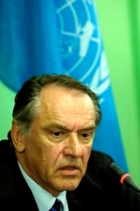Darfur peace talks will fail to start in August deadline
KHARTOUM, July 7 (Reuters) – Darfur peace talks will fail to start by an August deadline but the contentious issue of which rebel groups to invite may have been resolved by then, the U.N. envoy to the region said on Saturday.

“We are hoping that we will be at a stage (by the end of August) where we will be ready to take a decision on sending invitations,” Jan Eliasson, the U.N. Darfur envoy, told reporters at the end of a visit to Khartoum.
“I will not go into setting a date for negotiations,” he added. The United Nations had previously said it had hoped to start the talks by August.
Many faulted an international policy of “deadline diplomacy” for the unpopular 2006 deal for the remote western region, which most of the 2.5 million Darfuris in refugee camps reject.
International experts estimate 200,000 have died in four years of rape, killing and disease in Darfur, violence Washington calls genocide. Khartoum rejects the term and puts the death toll at 9,000.
UNRESOLVED ISSUES
Eliasson said the choice of which rebel groups to invite was a difficult one, adding: “We are right now in the process of choosing the ones we are contacting.”
The venue, the date of talks and which points could be reopened of the unpopular peace deal signed last year were also still to be agreed upon, Eliasson said.
The government has made clear it will not reopen the 2006 peace deal during new talks, leaving little diplomatic space for the fresh peace process.
Eliasson said the new talks were aimed at achieving only “amendments to the last agreement”, something that will upset many rebel groups who want more than what the 2006 deal offered.
The invitations, once sent, would be the first major test of the political will of the parties to the conflict to find a negotiated settlement, Eliasson said.
It could then take months to convince rebels leaders to attend, drop any preconditions to talks and agree on a venue.
Eliasson warned those hindering the peace process.
“If there is no progress, if there is lack of cooperation, the signs are very clear from the international community not least the (U.N.) Security Council that there is a price to be paid for non-cooperation.”
Seven months and four visits after his appointment, Eliasson, with his African Union counterpart Salim Ahmed Salim, still have many obstacles ahead.
“The main obstacle is to achieve the coordination of the positions among the rebel movements,” he said.
Mostly non-Arab rebels in Darfur took up arms in early 2003, accusing central government of neglecting the arid region.
(Reuters)
